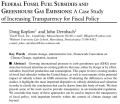Federal Fossil Fuel Subsidies and Greenhouse Gas Emissions: A Case Study of Increasing Transparency for Fiscal Policy

Annual Review of Energy and the Environment, November 2001.
Article provides a normalization and comparison of all of the major quantitative studies on US subsidies to fossil fuels over the last 25 years; a summary and discussion of multi-country efforts to model the climate change benefits associated with reforming subsidies to fossil fuels; and an evaluation of how existing checks-and-balances routinely applied to regulatory policy could be used in the fiscal policy arena to ensure improved alignment between fiscal initiatives and environmental and/or other policy goals.
Growing international pressure to curb greenhouse gas (GHG) emissions has focused attention on existing policies that may, either by design or by effect, subsidize fossil fuel production and consumption. This paper reviews existing studies of fossil fuel subsidies within the United States, as well as assessments of the potential impact of subsidy reform on GHG emissions. Evaluating the differences across the studies, it highlights the most important disparities in subsidy definition and valuation in order to clarify the conclusions that can be drawn from this body of work. We then present some of the tools used to provide transparency in environmental regulation. We conclude that many of these approaches can be used to improve the transparency of fiscal policy, with important benefits within the context of climate change and beyond.

